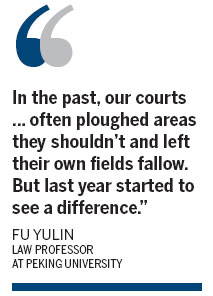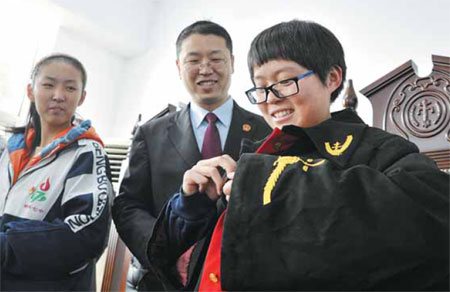Courts test new ground in year of change
Updated: 2014-01-13 13:41
By Cao Yin (China Daily USA)
|
||||||||

Transparency, use of social media herald new era
With "tigers" in the dock and reform in the headlines, 2013 may prove to have been a springboard for major change in the justice system, especially in transparency, legal experts say.
Chinese courts heard some of world's most high-profile cases last year - and at the same time tested some very fresh ground.
Judicial authorities nationwide for the first time used micro blogs and other new media to interact with the public, sharing information on verdicts and even real-time reports during trials.
For the trial of former Chongqing Party chief Bo Xilai, one of several high-ranking officials - known as tigers - prosecuted for corruption last year, the court posted updates on Sina Weibo.
A plan was also announced to set courts free of administrative rankings, to better prevent interference from local governments, as well as new guidelines to avoid wrongful convictions.
Attorneys and law professors welcomed the breakthroughs of 2013, but they have also urged the Supreme People's Court to speed up efforts to improve openness and independence.
"Transparency is at the core of any justice system," said Wang Zhenmin, dean of Tsinghua University's School of Law. "Not only does it ensure fair verdicts, but also confidence among the people."
Wang said he was glad to see China's top court shift its focus from quantity and "superficial administrative work" to quality.
"Courts have always been required to be open, but they rarely were," he said, adding that, by comparison, last year he was "surprised how much more information was released about trials and verdicts" by authorities.
Transparency
In November, the Supreme People's Court established a national online database for all verdicts.
Pilot programs were also launched in Shanghai and Zhejiang province to send text message updates about trial dates and times, while a website set up in October details complaints against parties who have failed to abide by a court decision.
To cater to the growing number of Internet users and people who access the Web through smartphones and mobile Internet devices, many courts opened micro blogs and accounts on Wechat, Tencent's instant voice and text messaging service.

On June 26, Beijing High People's Court posted its first message on Sina Weibo, writing that the goal was to "provide an authoritative legal voice" and "improve justice in the city". Today the account has 910,000 followers.
"The number of followers soared after we posted updates of several trials in September," said Zhao Yan, who runs the micro blog, referring to the month in which three high-profile cases were heard, including the prosecution of Beijing airport bomber Ji Zhongxing.
"We'll post real-time updates and verdicts more often," he added.
The Supreme People's Court, which opened an account in November, has about 750,000 followers.
Many of the innovations of 2013 remain at the preliminary stage, although Wang at Tsinghua University suggested some steps could be skipped to speed things up.
"After all," he said, "we've reached an agreement on such things as the need for judicial transparency so the pace of the reform can really be quickened."
Chen Weidong, a law professor at Renmin University of China, agreed and stressed there is a lot of work to be done in 2014 to further improve judicial transparency.
Simple things, such as making it easier for citizens to actually watch trials, still need to be addressed, he said.
Under the current rules, people must apply several days in advance to sit in a court's public gallery, and many are rejected without receiving a clear reason.
"The Supreme People's Court has to improve the way it observes and receives feedback from lower courts, otherwise they risk making any progress in short term," Chen warned.
Convictions overturned
Along with testing new communication tools, courts have also made headlines for overturning several wrongful convictions over the past 12 months.
In May, Zhang Gaoping and his nephew Zhang Hui were each awarded 1.1 million yuan ($180,000) in compensation after their 2003 convictions for rape and murder were quashed. DNA evidence proved their innocence at a March appeal hearing in Anhui province.
Zhang Zhenfeng, a farmer from Henan province, also saw his burglary and rape conviction from 2007 overturned in September after it was discovered a police officer had concealed vital evidence that cleared his name.
Renmin University professor Chen said he hopes to see more efforts in checking the legitimacy of verdicts and correcting wrongful convictions, so that "everyone can feel there is justice in each case".
The vow to end China's controversial laojiao - reeducation through labor - system, which since the 1950s has allowed authorities to sentence people without trial for up to three years, has also been a major talking point.
The punishment was mostly used for minor offenses, such as causing a public disturbance.
However, media attention intensified in July when Tang Hui was awarded 2,941 yuan in compensation after suing authorities in Yongzhou, Hunan province, for sentencing her to laojiao for petitioning. She had repeatedly called for harsher prison sentences for the men convicted of raping her daughter.
The State Council, China's Cabinet, approved the proposal to end laojiao in December, with facilities set to close or be converted into drug rehabilitation centers and prison units.
Many laojiao centers have already released all their inmates, regardless of how much time they had left to serve.
Guaranteeing quality
If "transparency" was the buzzword in courts last year, experts appear to agree in 2014 it should be "independence".
The Supreme People's Court is expected to announce a reform that will separate the judiciary from administration, identified as a key task at the Third Plenary Session of the 18th Central Committee of the Communist Party of China, held in November.
For years, courts have depended on financing from local governments, meaning they sometimes had to get administrative approval for a verdict. The reform will aim to prevent authorities affecting court decisions, financing and management.
Legal professionals and academics have universally welcomed the move.
"In the past, our courts ... often ploughed areas they shouldn't and left their own fields fallow. But last year started to see a difference," said Fu Yulin, a law professor at Peking University.
She said the emphasis now is firmly on guaranteeing the quality of trials and judgments.
Yet courts still need to strengthen the awareness of independence among judges, she added, as links between individuals in the judicial and administrative spheres will remain for some time.
caoyin@chinadaily.com.cn
|
A middle school student tries on a robe during a court's open day activity in Bengbu, Anhui province, on Dec 4. Gao Jianye / for China Daily |
(China Daily USA 01/13/2014 page5)
Most Viewed
Editor's Picks

|

|

|

|

|

|
Today's Top News
China is now No 1 in trade
PANDA! opens in Las Vegas
Rich Chinese tourists looking to space
Deals 'blow' against separatists
Sharp fall in tourism hits Beijing
Sharon's legacy full of contradictions
Lenovo targets US, but when?
Embraer extends coverage in China's aircraft market
US Weekly

|

|















